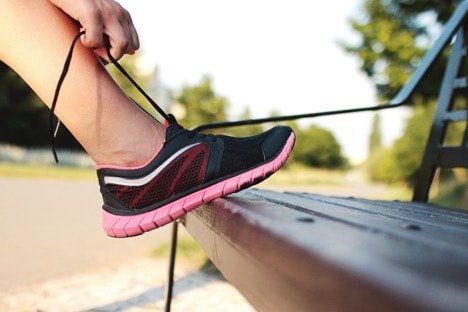Running for Weight Loss: How to Do it Without Injuring Yourself
If you’re looking to start running for weight loss, it’s important to make sure that you take the right steps beforehand to make sure that you don’t injure yourself. An injury will only put you that much further away from losing the weight.
A lot of people believe that overweight people shouldn’t run because it can be bad on your joints and it’s easier to injure yourself. While there is some truth to that to some degree, running can still be a really great way to shed weight if you do it the right way.
Studies show that people who run are consistently leaner than people who do equivalent amounts of other types of exercise. (1)
Even if you have a little more weight on you than you’d like, that doesn’t mean you can’t enjoy running. It can be a lot of fun and it really does it burn off the calories!
It’s important, though, to make sure that you do it in a way that’s safe for your body.
There’s nothing worse than starting an exercise program, then getting injured and having to stop. It’s disheartening and can seriously derail your weight loss efforts.
Before you throw on the sporty headband and download “Eye of the Tiger” to your phone, remember that being successful at running means setting realistic goals for yourself and listening to your body. You can do long-term damage to yourself if you don’t.
Ready to get started?
This post may contain affiliate links, which helps keep this content free. Please read our disclosure for more info.
See Your Doctor Before You Start Running for Weight Loss
Running can be rough on your body, especially if you’re considered obese or haven’t exercised in a while. It’s amazing for your heart, mental state, and well-being in general, but it might not be the right exercise for you right now.
Maybe it’s time to get a physical, anyway.
Your doctor will check your heart, blood pressure, any injuries you’ve had in the past, joint health, meds, diseases you might have, and anything else he or she thinks is important.
The way you eat might also need to change when you start a running program, so ask your doctor or nutritionist for tips about dieting.
Sports physicians stress that it’s important to educate yourself about running before you begin. A study done in the Netherlands found that novice runners training for a 5k marathon were less likely to have a running-related injury when they were part of an online injury prevention program. (2)
If you can, find a good sports doctor who can help you with getting started.
Running can have a huge impact on your overall health, but you need to make sure that the impact is a good one!
Invest in Good Running Gear

At the very least, you’ll need a good pair of running shoes. We know there are lots of cool-looking kicks out there, barefoot or minimalist shoes, and other shoes that might catch your eye, but fit and form is everything.
If you don’t have shoes that fit well or shoes that are worn out or aren’t designed specifically for running, you might find yourself in a world of hurt. You can get shin splints, tendinitis, joint stress and pain, and increase your potential to fall or twist an ankle.
They’ll also help make sure that your body is in alignment, so you don’t mess up your back.
Find a good store that specializes in athletic shoes and they’ll help you find the right shoes.
Some runners will tell you that the clothes you wear can also make or break you when it comes to developing a regular running habit. Blistering and chafing are a big deal and can make you extremely uncomfortable.
If your body type runs on the fluffy side, you might want to consider compression shirts and pants. They can help with chafing, reduce swelling and soreness, increase oxygenation, and accelerate the recovery process.
If you tend to overheat and chafing won’t be an issue, get breathable clothing that will keep the sweat off your skin.
Start Out Slowly and Work Your Way Up to Running for Weight Loss
We know you’re probably excited to get to steppin’, but to prevent injury it’s important to ease into a running program, especially if you’re overweight.
One reason is that running is hard on the bones and joints. Running will increase your bone density, but if you start out too quickly, you can get stress fractures and shin splints. (3)
Experts suggest walking first for a week or two, then getting on a schedule of walking and running. Here’s one that works well for beginners.
- Walk for 10 minutes to get warmed up.
- Run for 30 seconds.
- Walk for a minute.
- Continue with this for as long as you feel comfortable.
- End the run with a five-minute walk to cool down.
You can increase the times and distance when you feel that your body is ready to handle it. Be gentle and set realistic goals for yourself.
Every running expert also agrees that recovery time is a big part of keeping yourself injury-free. Run every other day, and have at least one impact-free day, meaning, do yoga or some other no-impact exercise.
Use Single-Leg Exercises to Prevent Injuries
One of the reasons that running newbies get injured is muscle imbalance. Most of us tend to favor one leg over the other, and since we run with the whole body, we can overcompensate for one side of our body being stronger than the other.
Single leg exercises can get your legs on a more even keel and keep you from getting muscle and joint injuries. You train each leg separately with the same amount of reps on each side.
Here’s a good one to try:
Hire a Running Coach
It can be hard to get motivated to lose weight and exercise when you’re on your own. It’s way too tempting to skip days and snuggle up for some extra sleep or skip the workout and meet friends for drinks.
Starting any exercise program is a commitment. Essentially what you are doing is creating a new healthy habit that you’ll hopefully continue long after you’ve lost the weight.
Working out with a running coach is going to keep you motivated and help you learn how to run the proper way. Injuries often happen when new runners don’t know proper form or push themselves too hard.
A running coach is just like a personal trainer. They’ll set up a running schedule that will fit your needs and help you obtain your weight loss goals safely. They can also give you exercises that will decrease your risk of injury and teach you the proper way to run.
If you don’t have the means to hire a coach or simply prefer to work out on your own, there are some great personal training apps that you can download to your phone.
Many of them have tips to help you with your run, keep track of running and weight loss stats, and have online support communities. Check out free app Endomondo, which is just like having a personal trainer in your pocket.
Make Sure You Get Enough Healthy Carbs and Lean Proteins

If you’re a running newbie, you might not be aware of how important food is for this type of exercise. You might be an old hat at dieting, but there are a few things you should know about eating before you start your new practice.
Running burns tons of calories, but if you do it the wrong way, your body can actually hold on to fat. You can also find yourself fatigued, which can cause injury if you’re not careful.
A study published in 2017 found that running can temporarily increase cortisol, a stress hormone, and decrease insulin sensitivity. Both of these things can cause the body to hold onto fat, especially around the belly. (4)
It’s important to eat plenty of protein and fresh fruits and vegetables, but don’t skip the carbs. Your body needs fuel to burn, so make sure to eat whole grains.
Be discerning about flavored water with electrolytes, protein powders, drinks, and bars that are marketed to runners. They can have added sugars, chemicals, and poor-quality protein in them.
If you’re going to start running, choosing quality foods is more important than ever.
How to Lose Weight Without Exercising
If you decide that running isn’t your thing or if you ONLY read this article because you believe that you HAVE to run to lose weight… Listen up!
We created a fast weight loss plan that doesn’t require exercising because most of our clients are over 200 pounds and just can’t fit the exercise into their lives while keeping their willpower strong enough to stick with their diets.
And we get it! Your willpower is limited and sometimes making too many changes at once can botch your entire weight loss plan.
Our 21-Day Fat Loss Challenge will help you lose 10-21 pounds in just 21 days, and it can be repeated in multiple rounds if you have more weight to lose! This allows you to take breaks when you need to and go at your own pace.
It also comes with access to a private support group where thousands of women are doing the diet plan together and sharing tons of motivation, encouragement, tips for success, and lots of recipes!
Click here to get started with YOUR 21-Day Fat Loss Challenge journey today!
If you enjoyed this article on running for weight loss or have any questions, please feel free to leave them in the comment section below!


Great post Lauren! Most overweight people have this ground root feeling that running is not for them. But starting small, being regular and incorporating a balanced diet can surely help one achieve their goal. Thanks a lot for sharing this!
I used to enjoy running but then I injured myself from going too fast too soon. You have some great advice here. I hope to start running again soon taking this on board.